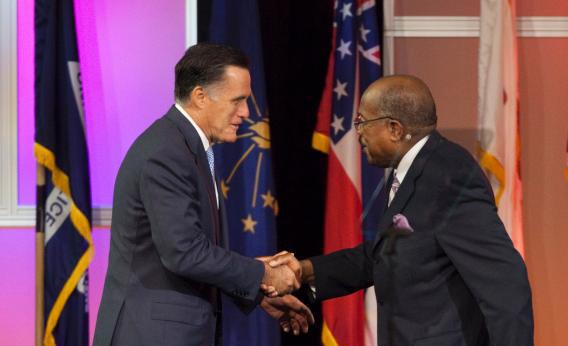If you want to know what Mitt Romney thinks of you, don’t listen to what he tells you. Listen to what he says about you at his next campaign stop.
Last weekend, Romney spoke at three fundraisers in the Hamptons. One was at the home of David Koch, a founder of the Cato Institute and former Libertarian Party nominee for vice president. Another was at the home of Ron Perelman, a past donor to Democrats and pro-choice Republicans. A third was hosted by Clifford Sobel, a prominent Jewish Republican contributor. The guests were cut from the same cloth. All three events were closed to the press. But given the pro-choice inclinations of wealthy, Jewish, Northeastern, and moderate Republicans, you can be pretty sure Romney didn’t bring up his pro-life position on abortion.
Romney was happy to talk about abortion two days later, though. At a town hall meeting in Colorado, a young man asked Romney: “In terms of social equality, and in terms of, like, women’s rights or gay rights, and liberty and that area, what is so wrong about exploring liberty, and giving liberty to everyone in every field, not just in the economy?” Romney replied:
I support the statement that you make. … There may be some places we have some differing viewpoints. I mean, I, for instance believe that when it comes to a very tender issue, which is the issue of abortion … well-meaning Americans come to different conclusions on that topic. And some, like myself, attach importance to the unborn child as a life.
The crowd applauded. But the young man hadn’t asked about abortion. He had asked about gay rights and women’s rights. Why didn’t Romney answer the question? Maybe it was because the young man’s voice set off the gaydar of everyone in the room. Or maybe it was because polls on gay rights, unlike polls on abortion, have shifted against Romney’s position. Either way, Romney chose not to touch that issue in front of a possibly gay questioner in a swing state.
Romney was happy to bring up gay marriage the next day, though. His audience was the National Association for the Advancement of Colored People. Blacks have generally opposed gay marriage more than whites have, though some polls have differed. That’s why Republicans have used gay marriage as a wedge issue to lure black voters. In his speech, Romney paused and carefully delivered a canned applause line that he hadn’t used in his campaign stops before white audiences: “ I will defend traditional marriage.” He got his biggest ovation of the morning.
Romney told the NAACP attendees he was there to earn their votes. “Support is asked for and earned, and that’s why I’m here,” he professed. But that night, he went to a fundraiser in Montana and proudly noted that the NAACP had booed him for criticizing “Obamacare”:
By the way, I had the privilege of speaking today at the NAACP convention in Houston and I gave them the same speech I am giving you. I don’t give different speeches to different audiences … When I mentioned I am going to get rid of Obamacare, they weren’t happy, I didn’t get the same response. That’s OK, I want people to know what I stand for and if I don’t stand for what they want, go vote for someone else, that’s just fine.
Why would Romney bring this up in Montana? Why would he tell the Montana audience it’s just fine if the NAACP doesn’t vote for him? I don’t know, but I can tell you this: Montana ranks dead last in the proportion of its population that is black, at 0.5 percent. In Montana, there’s only one black person for every 30 square miles.
It’s obvious from these four episodes that Romney, contrary to his boast, does say different things to different audiences. Among politicians, that’s nothing unusual. What’s unusual is that Romney, for further advantage, told each audience what he wouldn’t tell the last one. First he talked pro-choice Republicans into giving him millions of dollars. Then he told the gay-rights guy he was pro-life. Then he told the NAACP he was against gay marriage. Then he told the Montanans he had pissed off the NAACP. Romney didn’t just hide things from each audience. He dissed them.
The problem with this behavior, politically, is that once you recognize it looking backward, you can anticipate it going forward. If you’re black, and Romney sucks up to you by standing up to gays, you shouldn’t be surprised when he sucks up to whites by standing up to blacks. Today you’re the audience. Tomorrow you’re the prop. It’s one of life’s oldest rules: You can learn more about somebody by what he says about other people than by what he says about you.
William Saletan’s latest short takes on the news, via Twitter:
